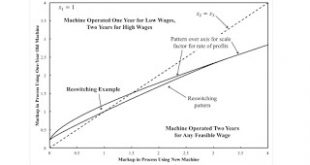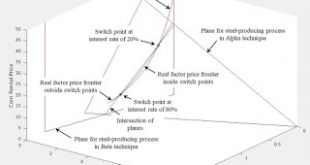A nice review of my book by Marc Morgan has appeared in American Affairs. Morgan works with Thomas Piketty at the World Inequality Lab at the Paris School of Economics. He is doing interesting work on profit accounting and determination. I would also note that Morgan attended the same secondary school (high school) as me in Dublin. Apparently, Christian Brothers College, Monkstown — although not a very prominent school in any meaningful sense — is creating a lot of heterodox...
Read More »Universal Basic Income: Some Advocates And Analysts
"In fact, the realm of freedom actually begins only where labour which is determined by necessity and mundane considerations ceases; thus in the very nature of things it lies beyond the sphere of actual material production. Just as the savage must wrestle with Nature to satisfy his wants, to maintain and reproduce life, so must civilised man, and he must do so in all social formations and under all possible modes of production. With his development this realm of physical necessity expands...
Read More »Reswitching With Markup Pricing And Fixed Capital
Figure 1: Two Dimensional Pattern Diagram1.0 Introduction This post extends an example from Bertram Schefold. It presents markup pricing in an example with a machine that can be operated for two years or junked after one year. This is a case of joint production in which, unlike in some cases, the choice of technique can still be analyzed by the construction of the wage frontier. Also, I do not think the question of requirements for use enter in here, and all matrices are square. As usual,...
Read More »Precursors of Piero Sraffa
I want to consider contributions to economics after 1870 that reconsidered classical or Marxist economics, used input-output models and linear algebra, or bear a family resemblance to at least some points in Sraffa's 1960 book. Vladimir K. Dmitriev. Used input-output analysis in an interpretation of Ricardo's theory of value. Ladislaus Bortkiewicz. Had a simple three-good model, with one basic good, input-output model of prices of production. Sraffa and others argued against aspects of his...
Read More »Why Does The Labor Theory Of Value Work Empirically As A Theory Of Prices?
[embedded content]Anwar Shaikh On The Transformation Problem Lots of empirical work shows that prices tend to be proportion to the labor embodied in commodities. My references in this article document this claim. Furthermore, empirical wage-rate of profits curves tend to be close to straight lines. This is not what, say, Sraffa' mathematical economics would lead me to expect. What explains these surprising empirical findings? Almost 34 minutes in, in the above video, Shaikh makes the...
Read More »Only The Super-Rich Can Save Us!
Neoliberals are hostile to labor unions and every other institution that would allow the vast majority of the population to have some effect on how we are ruled. And they have been so successful that only the super-rich can save us, as the title of a Ralph Nader novel a few years back had it. A couple of recent examples of journalism are about movements of the super-rich: Sheelah Kolhatkar writes, in the New Yorker, about Patriotic Millionaires. Theodore Schleifer writes, in Vox, about...
Read More »Towards the Derivation of the Cambridge Equation with Expanded Reproduction and Markup Pricing
I have a new working paper. Abstract: Does the Cambridge equation, in which the rate of profits in a steady state is equal to the quotient of the rate of growth and the savings rate out of profits, hold in an economy with widespread non-competitive markets? This article presents a multiple-good model of markup pricing in an attempt to answer this question. A balance equation is derived. Given competitive conditions, this model can be used to derive the Cambridge equation. The Cambridge...
Read More »The Factor Price Frontier In The Space Of Factor Rental Prices
Figure 1: Real Factor Price Frontier1.0 Introduction Carlo Milana has proposed a new way of visualizing the choice of technique, including in the case of reswitching. This way of describing what he has done is not neccessarily how he thinks of it. In this post, I describe his approach with a reswitching example, in a model of the production of commodities by means of commodities. 2.0 Technology Table 1 shows the coefficients of production for this example. Coefficients of production...
Read More »Some People Who Have Shaped Economics
"The University [of Chicago] is the best investment I ever made in my life." -- John D. Rockefeller Consider the following people and selected activities: Lewis Brown founded the American Enterprise Institute, in 1938. Jasper Crane cofounded the Foundation for Economic Education, in 1946. Leonard Read cofounded the Foundation for Economic Education, in 1946. Harold Luhnow, even before 1947, directed spending for the Volker Fund. Sir Antony Fisher funded the Institute for Economic...
Read More »2019 Nobel Prize Celebrating The Triumph Of Institutionalism?
[embedded content]Elizabeth Warren Echoing A View Institutionalists Understand This year, the "Nobel prize" in economics went to Abhijit Banerjee, Esther Duflo, and Michael Kremer. They champion empirical economics over theory. Previously, institutionalist economics was described as 'theory without measurement' (Koopmans 1947). Does institutionalist economics parallel the supposed mainstream empirical turn? Although institutionalists, as far as I know, did not have the resources to...
Read More » Heterodox
Heterodox


